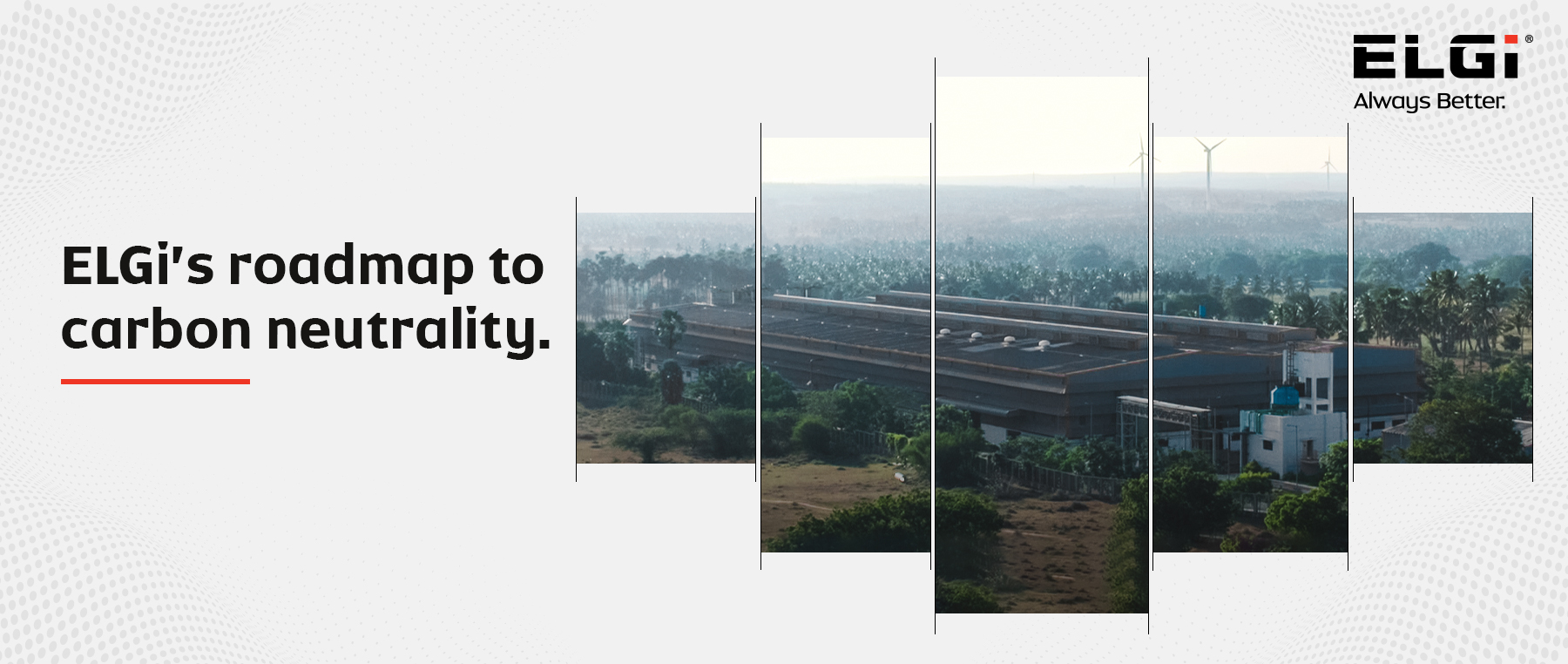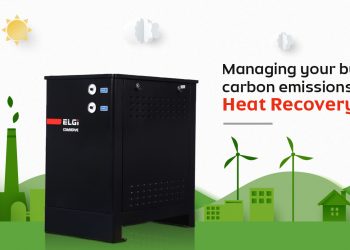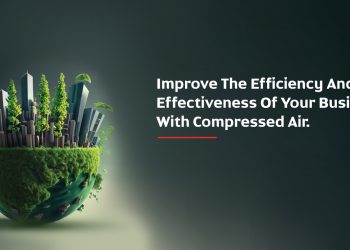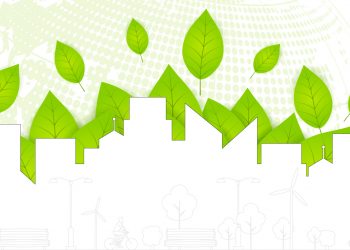ELGi’s roadmap to carbon neutrality

Climate change is a massive challenge. Many people think climate change mainly means warmer temperatures. But the temperature rise is only the beginning of the story. People are experiencing climate change in diverse ways. The consequences of climate change now include, among others, intense droughts, water scarcity, severe fires, rising sea levels, flooding, melting polar ice, catastrophic storms and declining biodiversity.
Although the use of renewable energy and energy efficiency has improved, progress is not fast enough to achieve global climate goals. Total renewable energy consumption increased by a quarter between 2010 and 2019, but the share of renewables in total final energy consumption is only 17.7% (2019).
All sectors—from commerce, healthcare, and education to agriculture, infrastructure, communications, and advanced technology—benefit from an established energy system. It is essential to have access to inexpensive, dependable, and ecological energy.
At ELGi, our commitment to addressing climate change comprises several low carbon initiatives coupled with a longer-term sustainability roadmap. For one, we've undertaken initiatives focused on reducing the carbon footprint of our manufacturing facilities and offices, together with a clearly defined dedication to building energy-efficient products that enable companies around the globe to reduce their carbon footprint.
What is UN Sustainable Development Goal 7 - Affordable and Clean Energy?
The goal strives to ensure access to affordable, reliable, sustainable and modern energy for all.
Under this – you have 3 things – https://sdgs.un.org/goals/goal7 - overview, targets, progress till date. All interesting insights and good learning for anyone not conversant. None of it is here. The content is all available – it just needs to be read and processed and the highlights copied and pasted here.
Overview:
· Impressive progress in electrification has slowed due to the challenge of reaching those hardest to reach. Although the number of people without access to electricity has reduced since 2010 (1.2 billion), 679 million people remain without electricity.
· International financial flows to developing countries for renewables declined for the second year in a row
· Progress in energy efficiency needs to speed up to achieve global climate goals
· Till 2020, 2.4 billion people were still using inefficient & polluting cooking systems
· Total renewable energy consumption increased by a quarter between 2010 and 2019, but the share of renewables in total final energy consumption is only 17.7%.
Targets for 2030:
· 7.1 - Ensure universal access to affordable, reliable and modern energy services
· 7.2 - Increase substantially the share of renewable energy in the global energy mix.
· 7.3 - Double the global rate of improvement in energy efficiency
· 7. a - Enhance international cooperation to facilitate access to clean energy research and technology, including renewable energy, energy efficiency and advanced and cleaner fossil-fuel technology, and promote investment in energy infrastructure and clean energy technology.
· 7. b - Expand infrastructure and upgrade technology for supplying modern and sustainable energy services for all in developing countries, small island developing States, and land-locked developing countries, per their respective programmes of support.
Progress till date:
· In 2020, 69 per cent of the global population had access to clean cooking fuels and technologies. The electricity sector records the largest share of renewables in total final energy consumption (26.2 per cent in 2019) and drives most of the growth in renewable energy use.
· Since 2015, global energy intensity has improved by 1.6 per cent per year on average, which is still short of the 3.2 per cent annual rate now needed to reach Sustainable Development Goal 7.3.
· International financial flows to developing countries in support of clean and renewable energy reached $10.9 billion in 2019.
· Installed renewable energy-generating capacity in developing countries reached a record 245.7 watts per capita in 2020.
· The war in Ukraine is driving up global energy prices and increasing energy insecurity in Europe. As a response, some European countries plan to speed up the transition to renewables and increase investments in renewables and energy efficiency.
· It would take least developed countries and landlocked developing countries almost 40 years to reach the same level of progress by the developing countries on average in 2020.
What steps has ELGi taken to coordinate their efforts with UN Sustainable Development Goal 7?
Always Resilient – Processes
ELGi is committed to energy management across its manufacturing locations since energy is a predominant contributor to the organization’s emissions. We harness renewable energy to meet a significant proportion of our energy requirements and are working to enhance the share of green energy in the overall energy mix. We have constantly endeavored to introduce new energy efficiency initiatives to counter rising energy demand and associated emissions.
We began with mapping our carbon dioxide emissions and identifying key energy sources. Over a decade ago, about 85% of the carbon emissions caused by five manufacturing units in India emanated from three sources: Electricity, high-speed diesel (HSD) equipment, and waste sand generation. After identifying the sources, we defined sustainable strategies to both contain and reduce emissions. In 2017, we replaced our traditional energy meters with smart meters, enabling the latter to sense loads
based on amperage (strength of an electric current in amperes), sense whether the load is less, or the machines are idle and distribute the load optimally. This exercise resulted in savings of about 1.5 million units of electricity per year.
In 2018, we introduced an Energy Management System (EnMS) at our Air Compressor Plant (ACP), our state-of-the-art campus at Kinathukadavu, near Coimbatore. The ACP was built over 100 acres with the best practices in manufacturing facilities globally, to manufacture airends. At the ACP, 145 IoT-enabled machines, all connected and sharing data seamlessly, were deployed to analyze the captured data using advanced statistical tools, identify energy-saving opportunities, improve systems, and conserve energy. Since then, our plant operations have achieved over 24% energy efficiency with the implementation of IoT-enabled energy management systems, resulting in power reductions of around 1.02 megawatts per year and significant savings in annual power spending. The Air Compressor Plant (ACP) has been certified by the ISO 50001:2018 Energy Management System, an annual certification audit by TUV Nord ensuring energy-efficient improvements year on year.
Diesel generator sets for running special-purpose machines were discontinued and replaced with UPS units that provided power back-ups for 10-15 minutes.
Compressed air supplied from the compressor room was being used to conduct preventive maintenance across our manufacturing units. There was always a gap in demand versus supply of compressed air. This issue was addressed by using small portable piston compressors, which were taken directly to the desired location for preventive maintenance exercises. This way, there was no wastage of compressed air, and we recognized energy savings running into millions of rupees every year.
Unutilized machines were also shut off during lunch breaks, adding to the energy and cost savings. Increasing the share of renewable energy in the total energy pie is a critical element of 'Green energy-driven manufacturing,' resulting in lowered dependency on conventional resources of energy. As early as 1994, we initiated a process by which renewable wind energy generated through five 250 kW windmills contributed to approximately 15% of the total power consumed at our manufacturing units. Until 2016, the full power generated through these windmills was consumed by the assembly plant at the headquarters. In 2016, the windmills were allocated for the ELGi Foundry, the ELGi Air Compressor Plant, and the assembly plant at headquarters in the ratio of 2:2:1.
There is immense opportunity to optimize and evaluate individual, energy-intensive processes within operations by monitoring and measuring the process units, lines, and machines consuming energy and then controlling overall consumption, economics and emissions. At ELGi, we've taken small but sure steps towards making the change to enable sustainable operational efficiency. We have adopted and continue to remain committed to TQM excellence and a PDCA approach in our energy management initiatives for successful implementations” - Narayan Thiruvengadam, VP – of Quality and Manufacturing.
What is the way forward?
With the aim of reducing our carbon footprint through better use of energy, we will continue to focus on manufacturing energy-efficient compressors and raising the efficiency of our existing products.
Compressors that operate with zero defects, deliver greater energy savings, and lower life cycle costs will be prioritized as we work to support our customers to achieve their ESG objectives.
As a responsible and environment conscious corporate, we will also continue to harness the power of technology to mitigate the environmental impacts of our own business. Efficient resource management in terms of water consumption and recyclability, and waste generated and disposed off will continue to receive high priority as we work to achieve resource neutral operations. The tenets of circularity, already incorporated in our operations, are set to be strengthened as we explore new avenues to convert the waste we generate into resources for other industries.






